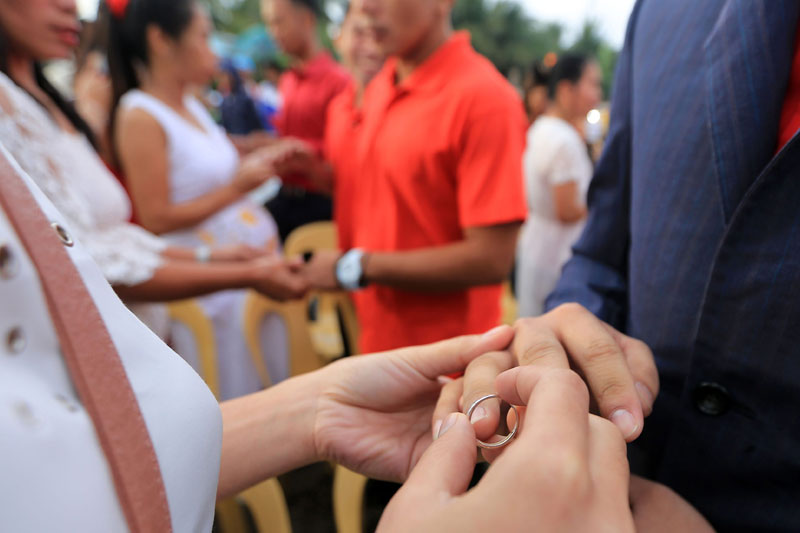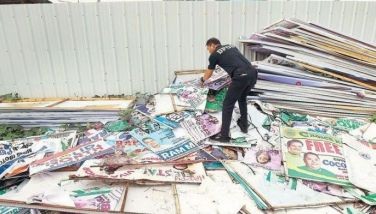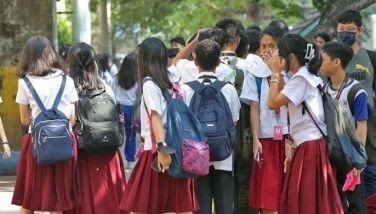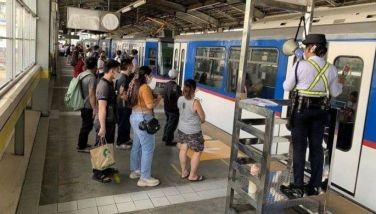’89 coup plotter recalls detention
August 9, 2003 | 12:00am
"One of the first things you ask yourself is where you went wrong, where are the logistics and manpower pledged by your leaders, and what will happen to your family now that you are in an isolation room barraged with questions from military interrogators."
This was how former Air Force Capt. Rolando Purugganan reminisced his days in prison after the failed December 1989 coup d’etat against then President Corazon Aquino.
Purugganan, who at the time was an idealistic junior officer, said that he once had the same concerns as Navy Lt. (senior grade) Antonio Trillanes IV.
But 14 years later, Purugganan, now a police superintendent and comptroller for Southern Tagalog, can only shake his head in disagreement with the leaders of the July 27 mutiny and was dismayed by the ease with which they duped Trillanes and other junior officers.
He said even today, junior officers are used as "pawns" by senior officers who capitalize on the gripes of junior officers to pursue their personal interests.
"Ang sugal nila pera lang, lalantad lang pag nanalo. Pag natalo, iiwan ka na. Kami, nakataya na ang buong buhay at career," he said.
A junior officer, he said, is left on his own once placed under military detention.
In an interview with The STAR, Purugganan recalled that the first time he took part in a military rebellion was in 1986 during the first EDSA people power revolt. Then a first lieutenant assigned under Col. Teodorico Viduya of the Narcotics Command, he was part of the team that took over People’s Television-4. Included in Viduya’s group were then Lt. Col. Eduardo Matillano of the defunct Constabulary Security Group (now PNP Intelligence Group) and Lt. Col. Francisco Zubia of the defunct Constabulary Highway Patrol Group, (now PNP Traffic Management Group).
Back then, Purugganan said junior officers did not ask questions. "We followed orders of our superiors." he said.
Three years later in 1989, as an instructor pilot assigned at the Fernando Air Base in Lipa City, he led a group of rogue military officers in the planned "takeover" of the air base.
The Fernando Air Base was the second staging point of fighter planes and a strategic site for launching air targets against the government.
"We waited for the reinforcements for three days, until we were informed that the coup is over. I was arrested and detained at the stockade of the Villamor Air Base in Pasay City," he recounted.
"It was useless, we had control over the air base but we weren’t able to implement our orders," he added.
For his adventurism, Purugganan was locked up for one year and five months. He was also restricted for three months and the government forfeited his salary. He was then only a few years married to his wife Felicidad, who was then five months pregnant with their second child. Their eldest child was only one year old.
Because of his role in the 1989 coup, he was not allowed to take posts in the military that dealt with operations. He later joined the Philippine National Police (PNP) when it was created in 1991.
Incidentally, Purugganan is the younger brother of Undersecretary Abraham Purugganan, one of the government negotiators in the July 27 Oakwood mutiny who was himself jailed after joining coups against the government in 1987.
Asked if he had regrets over his past involvement in failed military uprisings, Purugganan said his experience was one of the hard lessons he had to learn as a military officer.
He lauded the move of President Arroyo in calling for the imposition of maximum penalty for the July 27 mutineers, noting that former President Corazon Aquino was too lenient when it came to disciplining coup plotters.
"President Aquino was kind and very considerate of our actions. But this should not be the attitude during a crisis situation. It doesn’t solve the problem because would-be coup plotters will not be afraid of the consequences," he said.
When asked about his view on Sen. Gregorio Honasan, who has been implicated anew in the latest mutiny, Purugganan said Honasan seemed to be a dyed-in-the-wool revolutionary.
"He is not a politician. He has taken a life of a revolutionary leader. But taking up arms against the government is not the way to address the problem," he said.
This was how former Air Force Capt. Rolando Purugganan reminisced his days in prison after the failed December 1989 coup d’etat against then President Corazon Aquino.
Purugganan, who at the time was an idealistic junior officer, said that he once had the same concerns as Navy Lt. (senior grade) Antonio Trillanes IV.
But 14 years later, Purugganan, now a police superintendent and comptroller for Southern Tagalog, can only shake his head in disagreement with the leaders of the July 27 mutiny and was dismayed by the ease with which they duped Trillanes and other junior officers.
He said even today, junior officers are used as "pawns" by senior officers who capitalize on the gripes of junior officers to pursue their personal interests.
"Ang sugal nila pera lang, lalantad lang pag nanalo. Pag natalo, iiwan ka na. Kami, nakataya na ang buong buhay at career," he said.
A junior officer, he said, is left on his own once placed under military detention.
In an interview with The STAR, Purugganan recalled that the first time he took part in a military rebellion was in 1986 during the first EDSA people power revolt. Then a first lieutenant assigned under Col. Teodorico Viduya of the Narcotics Command, he was part of the team that took over People’s Television-4. Included in Viduya’s group were then Lt. Col. Eduardo Matillano of the defunct Constabulary Security Group (now PNP Intelligence Group) and Lt. Col. Francisco Zubia of the defunct Constabulary Highway Patrol Group, (now PNP Traffic Management Group).
Back then, Purugganan said junior officers did not ask questions. "We followed orders of our superiors." he said.
Three years later in 1989, as an instructor pilot assigned at the Fernando Air Base in Lipa City, he led a group of rogue military officers in the planned "takeover" of the air base.
The Fernando Air Base was the second staging point of fighter planes and a strategic site for launching air targets against the government.
"We waited for the reinforcements for three days, until we were informed that the coup is over. I was arrested and detained at the stockade of the Villamor Air Base in Pasay City," he recounted.
"It was useless, we had control over the air base but we weren’t able to implement our orders," he added.
For his adventurism, Purugganan was locked up for one year and five months. He was also restricted for three months and the government forfeited his salary. He was then only a few years married to his wife Felicidad, who was then five months pregnant with their second child. Their eldest child was only one year old.
Because of his role in the 1989 coup, he was not allowed to take posts in the military that dealt with operations. He later joined the Philippine National Police (PNP) when it was created in 1991.
Incidentally, Purugganan is the younger brother of Undersecretary Abraham Purugganan, one of the government negotiators in the July 27 Oakwood mutiny who was himself jailed after joining coups against the government in 1987.
Asked if he had regrets over his past involvement in failed military uprisings, Purugganan said his experience was one of the hard lessons he had to learn as a military officer.
He lauded the move of President Arroyo in calling for the imposition of maximum penalty for the July 27 mutineers, noting that former President Corazon Aquino was too lenient when it came to disciplining coup plotters.
"President Aquino was kind and very considerate of our actions. But this should not be the attitude during a crisis situation. It doesn’t solve the problem because would-be coup plotters will not be afraid of the consequences," he said.
When asked about his view on Sen. Gregorio Honasan, who has been implicated anew in the latest mutiny, Purugganan said Honasan seemed to be a dyed-in-the-wool revolutionary.
"He is not a politician. He has taken a life of a revolutionary leader. But taking up arms against the government is not the way to address the problem," he said.
BrandSpace Articles
<
>
- Latest
- Trending
Trending
Latest
Trending
Latest
Recommended




























